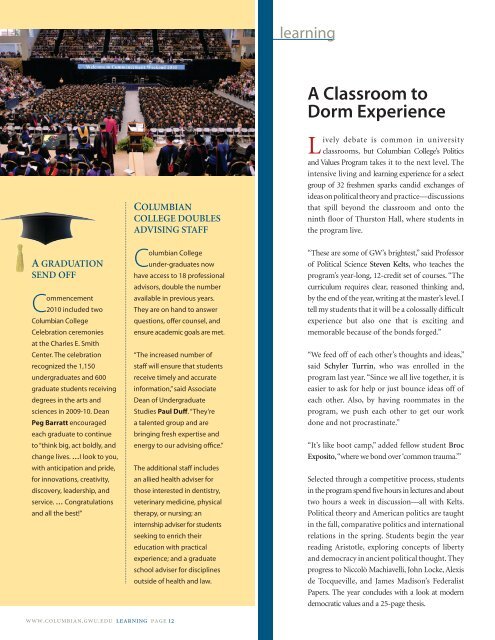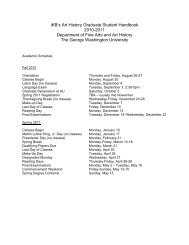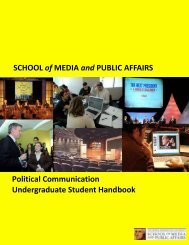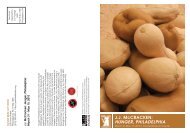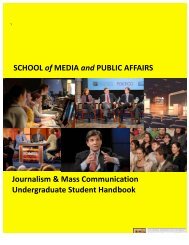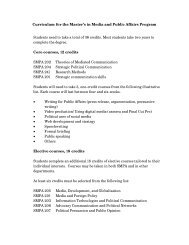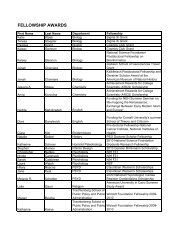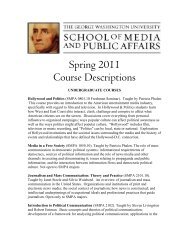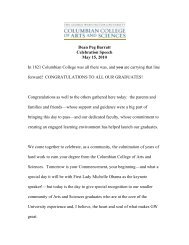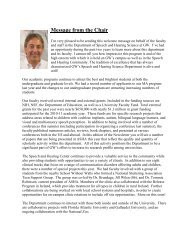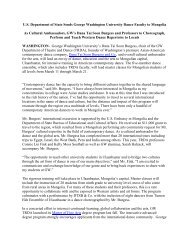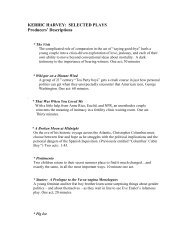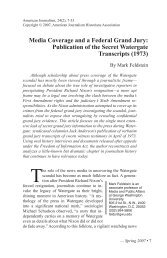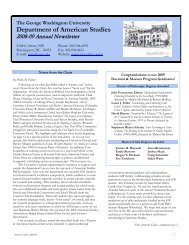Autism Forensic Science Immigration Trends Teaching Recipe for ...
Autism Forensic Science Immigration Trends Teaching Recipe for ...
Autism Forensic Science Immigration Trends Teaching Recipe for ...
You also want an ePaper? Increase the reach of your titles
YUMPU automatically turns print PDFs into web optimized ePapers that Google loves.
a GRaduatioN<br />
SeNd oFF<br />
Commencement<br />
2010 included two<br />
Columbian College<br />
Celebration ceremonies<br />
at the Charles e. Smith<br />
Center. The celebration<br />
recognized the 1,150<br />
undergraduates and 600<br />
graduate students receiving<br />
degrees in the arts and<br />
sciences in 2009-10. Dean<br />
Peg Barratt encouraged<br />
each graduate to continue<br />
to “think big, act boldly, and<br />
change lives. …i look to you,<br />
with anticipation and pride,<br />
<strong>for</strong> innovations, creativity,<br />
discovery, leadership, and<br />
service. … Congratulations<br />
and all the best!”<br />
www.columbian.gwu.edu learning page 12<br />
coLumBiaN<br />
coLLeGe douBLeS<br />
adviSiNG StaFF<br />
Columbian College<br />
under-graduates now<br />
have access to 18 professional<br />
advisors, double the number<br />
available in previous years.<br />
They are on hand to answer<br />
questions, offer counsel, and<br />
ensure academic goals are met.<br />
“The increased number of<br />
staff will ensure that students<br />
receive timely and accurate<br />
in<strong>for</strong>mation,” said Associate<br />
Dean of undergraduate<br />
Studies Paul Duff. “They’re<br />
a talented group and are<br />
bringing fresh expertise and<br />
energy to our advising office.”<br />
The additional staff includes<br />
an allied health adviser <strong>for</strong><br />
those interested in dentistry,<br />
veterinary medicine, physical<br />
therapy, or nursing; an<br />
internship adviser <strong>for</strong> students<br />
seeking to enrich their<br />
education with practical<br />
experience; and a graduate<br />
school adviser <strong>for</strong> disciplines<br />
outside of health and law.<br />
learning<br />
A classroom to<br />
dorm experience<br />
lively debate is common in university<br />
classrooms, but Columbian College’s Politics<br />
and Values Program takes it to the next level. The<br />
intensive living and learning experience <strong>for</strong> a select<br />
group of 32 freshmen sparks candid exchanges of<br />
ideas on political theory and practice—discussions<br />
that spill beyond the classroom and onto the<br />
ninth floor of Thurston Hall, where students in<br />
the program live.<br />
“These are some of GW’s brightest,” said Professor<br />
of Political <strong>Science</strong> Steven kelts, who teaches the<br />
program’s year-long, 12-credit set of courses. “The<br />
curriculum requires clear, reasoned thinking and,<br />
by the end of the year, writing at the master’s level. I<br />
tell my students that it will be a colossally difficult<br />
experience but also one that is exciting and<br />
memorable because of the bonds <strong>for</strong>ged.”<br />
“We feed off of each other’s thoughts and ideas,”<br />
said Schyler turrin, who was enrolled in the<br />
program last year. “Since we all live together, it is<br />
easier to ask <strong>for</strong> help or just bounce ideas off of<br />
each other. Also, by having roommates in the<br />
program, we push each other to get our work<br />
done and not procrastinate.”<br />
“It’s like boot camp,” added fellow student Broc<br />
exposito, “where we bond over ‘common trauma.’”<br />
Selected through a competitive process, students<br />
in the program spend five hours in lectures and about<br />
two hours a week in discussion—all with Kelts.<br />
Political theory and American politics are taught<br />
in the fall, comparative politics and international<br />
relations in the spring. Students begin the year<br />
reading Aristotle, exploring concepts of liberty<br />
and democracy in ancient political thought. They<br />
progress to Niccolò Machiavelli, John locke, Alexis<br />
de Tocqueville, and James Madison’s Federalist<br />
Papers. The year concludes with a look at modern<br />
democratic values and a 25-page thesis.


